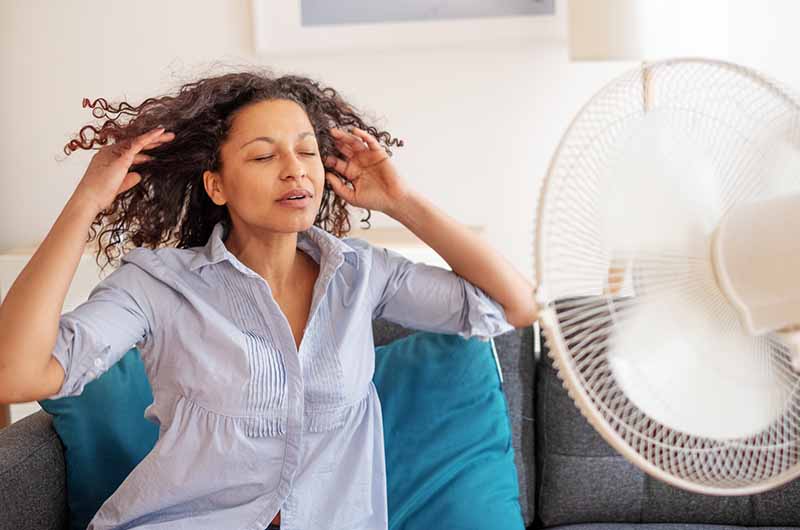Beat the heat: Strategies to protect your heart and brain

Did you know extreme weather can affect your heart health? Heatwaves cause more deaths than floods, tornadoes and earthquakes combined. And older adults, people with ongoing health problems and women are more vulnerable.
Hot weather acts as a challenge for your heart, sort of like a stress test, according to Dr. Lance Becker, the head doctor for emergency medicine at Northwell Health, a medical provider in New York. Certain people’s bodies cannot handle this challenge well. "They could have a heart attack. Their congestive heart failure symptoms could get much worse. Or they could have an arrhythmia," which is the medical term for an abnormal heart rhythm.
Heat and our bodies
Healthy bodies have an effective natural cooling system, directing blood toward the skin — allowing heat to escape through the skin's surface — and sweating, which takes away heat as it evaporates on our skin. This helps regulate body temperature and prevent overheating. However, too much heat can overpower the system, which can become dangerous, according to Becker.
According to a recent study, extreme heat and air pollution raise heart attack risks, especially in older adults and women. Research published in 2022 found that one in every 100 cardiovascular deaths may be attributed to extreme temperature days, and people with heart failure are at a higher risk than most. Meanwhile, a 2020 report by the Centers for Disease Control and Prevention cited research showing that hospital admissions for cardiovascular problems jumped in the days following temperatures spiking. And a 2017 review of research in the American Heart Association journal Stroke concluded that hot temperatures seem to increase the immediate risk of having a clot-caused ischemic stroke, the most common type of stroke.
If you have a history of heart issues, high blood pressure, stroke or obesity, you're more likely to have heat-related problems. Similarly, the CDC cautions that people with diabetes might have damage to their blood vessels and nerves, which could make it harder for them to cool down effectively.
How can you stay safe?
- Know the symptoms. Signs that your body is getting too hot, known as heat exhaustion, can include a headache, feeling dizzy, being weak, feeling sick in your stomach, and having cool and sweaty skin. You should move to a cooler place or use a wet cloth to cool down. If you still feel bad after about an hour, it's a good idea to get help from a health care professional. If heat exhaustion goes untreated, it can escalate to heat stroke, which is a more serious medical emergency. You might notice a fast and strong pulse, a body temperature higher than 103°F, and skin that's red, hot, and dry.
- Drink lots of water, but not alcohol. Staying hydrated is important because it makes your heart pump blood more easily and helps your muscles do their job better, explains Dr. Rachel M. Bond, director of women's heart health at Dignity Health in Arizona. The exact amount of liquids you should have might be different for each person. Dr. Bond usually tells her patients to drink around 64 ounces daily unless their heart health requires them to drink less. It's also a good idea to stay away from alcohol because it can make you lose more water from your body, which leads to dehydration.
- Keep cool. If you don't have air conditioning, or you can't go to a cool place, Dr. Becker suggests using a fan and a spray bottle or a wet cloth. He explains that if you sit in front of a fan and gently spray water on yourself or use a damp cloth on your skin, the water evaporates, which helps make you cooler.
- Monitor your medications. People with heart issues need to be careful and take their prescribed medicines regularly. If someone has high blood pressure or heart failure, they might use medicines called diuretics to remove extra fluid from their body. But they could also need to drink more fluids when it's hot. Dr. Becker says this can be confusing: "Because of that, we generally recommend that those people simply avoid heat stress, because it is very difficult to manage that properly."
- Eat lighter, water-rich foods. If you've always liked eating summer foods like watermelon or cucumbers, you can still enjoy them, says Dr. Bond, because they have a lot of water in them. Dr. Becker suggests skipping heavy meals. When your body is working hard to send blood to your skin to keep you cool, it's not the right time to eat a big meal that will need more blood for digestion.
- Pay attention to the time and what you're wearing. In the really hot Phoenix desert, Dr. Bond and other doctors often tell people not to go outside during the super-hot part of the afternoon. They also suggest wearing clothes that are loose, light and have light colors to help stay cooler.
- Exercise, but be smart about it. Staying active is still important for your health, even when it's hot. If you can, it's better to exercise indoors or try swimming. Parents and coaches can support kids playing sports, but they need to know about the dangers of heat. The CDC provides heat-related guidance for athletes.
- Take care of one another. "This is really the time for community spirit," Becker said. He says that many people die from the heat because they're alone. He recommends looking out for neighbors, friends and family members who might be at risk. You can say, "It's going to be really hot. Can I assist you in any way?" You could also invite them to spend time in a place with air conditioning. According to Becker, showing this kind of spirit can truly help save lives.





